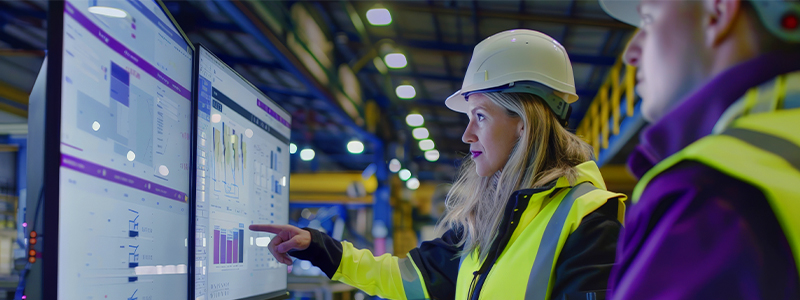The Backbone of Smart Manufacturing: ERP Software
As manufacturing continues to evolve toward digitization, the role of ERP software for manufacturing has become indispensable. It serves as the operational core, ensuring that every process—whether it's production, procurement, or dispatch—is interconnected and optimized through a single platform.
Integrating Operations Across the Factory Floor
Unlike traditional systems that operate in silos, modern ERP software for factory environments offers comprehensive visibility across all operations. From inventory control to shop floor management, every data point is captured and shared in real time—eliminating redundancies and manual errors.
This centralization of operations ensures quicker decision-making, better collaboration between departments, and a streamlined production workflow.
Empowering Smart Factories with Automation
Automation is the core of smart manufacturing. With built-in automation features, manufacturing ERP software can trigger actions such as generating purchase orders, conducting quality checks, and scheduling production without requiring human intervention. This improves accuracy and frees up valuable time for teams to focus on strategic tasks.
Data-Driven Insights for Strategic Planning
More than just a transaction system, today's ERP solutions come equipped with advanced analytics and dashboards. They provide KPIs in real time, allowing manufacturers to evaluate performance, identify bottlenecks, and plan more effectively.
ERP transforms raw factory data into meaningful insights—giving businesses the confidence to scale intelligently and respond quickly to changes.
Making Real-Time Data Work: From Sensors to Strategy
The digital transformation of factories isn't just about collecting data—it's about using it smartly. Real-time data analytics, when combined with ERP software, helps manufacturers shift from reactive operations to predictive, strategic decision-making.
Connecting IoT Devices with ERP Software
IoT devices installed on machines collect valuable data, including speed, temperature, and vibrations. When connected to ERP software for the manufacturing industry, this data is instantly processed and interpreted.
When a machine begins to show signs of wear, the ERP system can raise a maintenance request before the issue escalates—minimizing downtime and avoiding costly repairs.
Real-Time Monitoring for Continuous Improvement
With live dashboards and alerts, factory managers can track output levels, identify delays, and resolve inefficiencies as they happen. Whether it's a disruption in the supply line or a spike in defect rates, real-time data analytics ensures that teams respond within minutes, not hours.
This capability builds a culture of continuous improvement—where every small data point contributes to larger operational excellence.
Enabling Predictive and Preventive Decision Making
Beyond immediate actions, ERP systems also help forecast future events. By analyzing historical and real-time data together, manufacturers can:
- Predict demand fluctuations
- Plan machine maintenance schedules
- Adjust labor allocation
- Optimize energy usage
This shift from guesswork to insight-led planning is what makes a smart factory agile, scalable, and competitive.

Beyond Efficiency: Building a Responsive Supply Chain
The benefits of ERP software for manufacturing extend far beyond the walls of the factory. It also transforms the supply chain into a responsive, integrated network that adapts in real time.
Inventory Control with Live Data Feeds
Stockouts and overstocking are among the most common challenges in manufacturing. With ERP, inventory levels are updated in real time. The system triggers automatic reorder points based on actual consumption, supplier lead times, and forecasted demand.
This results in optimized inventory levels, better working capital management, and uninterrupted production schedules.
Supplier Collaboration and Procurement Visibility
ERP allows manufacturers to collaborate closely with suppliers by sharing demand forecasts, delivery schedules, and quality feedback. This transparency ensures that procurement is more strategic and less reactive.
If there is a delay from a supplier, the system automatically updates production schedules and identifies alternative sourcing options.
Logistics and Distribution Optimization
Through integration with logistics modules, ERP software for manufacturing industry also improves delivery performance. Real-time tracking of shipments and integration with warehouse systems guarantee timely and precise order fulfillment.
When supply chain decisions are powered by real-time insights rather than lagging reports, the entire manufacturing ecosystem becomes more resilient, efficient, and customer-focused.
From Compliance to Quality: ERP Covers It All
In industries with strict regulations and quality standards, ERP ensures that compliance isn't left to chance. Automated quality checks, audit trails, and real-time batch tracking help identify issues before they escalate. Digital documentation also enables faster and more accurate regulatory reporting.
For manufacturers handling multiple product lines or custom orders, ERP enables traceability, ensures consistency, and eliminates manual errors that could affect brand reputation.
Conclusion: ERP as the Nerve Center of Smart Factories
Smart factories are defined not by the machines they use, but by the decisions they make—decisions driven by data, speed, and strategy. ERP software transforms raw data into actionable intelligence, turning every process into an opportunity for improvement.
In a landscape where speed and accuracy are non-negotiable, real-time data analytics is the bridge between goals and results. With the right ERP system, manufacturers can unlock the full potential of innovative technologies and move confidently into the future.
If you ready to future-proof your factory? Fill out the form to schedule your personalized demo and discover how our manufacturing solution can power your smart factory.







